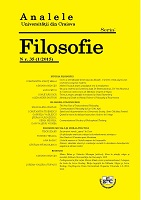IDENTITY AND DEATH IN NIKOLAI FEDOROV’S PHILOSOPHY OF RESURRECTION
IDENTITY AND DEATH IN NIKOLAI FEDOROV’S PHILOSOPHY OF RESURRECTION
Author(s): Alexander SautkinSubject(s): History of Philosophy, Metaphysics, Contemporary Philosophy
Published by: Editura Universitaria Craiova
Keywords: death; identity; resurrection; philosophy of the common task; transhumanism;
Summary/Abstract: Conceptions of death, formed in culture and appropriated by individual consciousness, serve as an essential mechanism of identification. In different cultures, there are different modes of dealing with death, and the culture of modernity is characterized by the rejection of death, in contrast to the archaic societies, where the dead were integrated into social order. This ‚hatred of death‛ reaches its climax in the philosophy of Russian thinker Nikolai Fedorov (1829-1903). He considers death as an absolute evil to be overcome in earthly reality. Fedorov’s views, based on unorthodox interpretation of the Christian idea of resurrection, open up the prospect for transhumanist concepts.
Journal: ANALELE UNIVERSITĂȚII DIN CRAIOVA. SERIA FILOSOFIE
- Issue Year: 1/2015
- Issue No: 35
- Page Range: 67-81
- Page Count: 15
- Language: English

